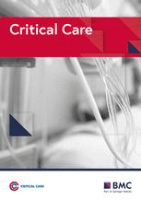
CRITICAL CARE
Scope & Guideline
Unlocking the future of critical healthcare.
Introduction
Aims and Scopes
- Interdisciplinary Approaches to Critical Care:
The journal emphasizes collaborative practices across various medical and nursing disciplines, highlighting how teamwork enhances patient outcomes in critical care settings. - Patient-Centered Care and Ethical Considerations:
A significant focus is on ethical decision-making and patient autonomy, particularly in high-stakes environments like the ICU where vulnerable patients require careful consideration of their rights and needs. - Innovative Technologies and Practices:
The journal showcases advancements in technology, such as telehealth and point-of-care ultrasonography, which are transforming the delivery of critical care, making it more efficient and effective. - Nursing Education and Professional Development:
There is a strong emphasis on the education and ongoing training of nursing professionals, with articles dedicated to developing competencies, leadership skills, and innovative teaching strategies. - Palliative and End-of-Life Care:
The journal addresses the importance of integrating palliative care principles into critical care, ensuring that patients receive holistic and compassionate care even in the face of severe illness. - Research and Evidence-Based Practice:
Articles often focus on the implementation of research findings into practice, promoting a culture of inquiry and evidence-based decision-making among nursing professionals.
Trending and Emerging
- Telehealth and Virtual Care Innovations:
The rapid integration of telehealth into critical care practice has gained significant attention, especially post-COVID-19, emphasizing the need for remote patient monitoring and virtual consultations. - Mental Health and Wellbeing of Healthcare Providers:
A growing emphasis on the mental health of nurses and healthcare providers is emerging, particularly in the context of the COVID-19 pandemic and its impact on work-related stress and burnout. - Ethics in Critical Care:
There is an increasing focus on ethical dilemmas faced in critical care settings, particularly regarding decision-making in complex cases involving vulnerable populations. - Palliative Care Integration in ICU Settings:
The integration of palliative care into critical care practices is trending, with a focus on improving the quality of life for patients with severe and chronic conditions. - Artificial Intelligence and Technology in Patient Care:
The exploration of artificial intelligence and its applications in electronic health records and patient monitoring systems is gaining traction, highlighting its potential to enhance clinical decision-making.
Declining or Waning
- Traditional Invasive Monitoring Techniques:
There is a noticeable decline in the discussion surrounding traditional invasive monitoring methods, as newer, less invasive technologies gain traction and become the standard in critical care. - General Critical Care Protocols:
The focus on generic critical care protocols appears to be waning in favor of more specialized and tailored approaches, reflecting a shift towards personalized medicine. - Single-Disease Focus Studies:
Research centered solely on single diseases in critical care settings is becoming less common, as there is a growing recognition of the need for comprehensive, multifaceted approaches to patient care. - Basic Nursing Skills Training:
There seems to be a decline in publications addressing basic nursing skills training, with a shift towards more advanced practice and competency-based training initiatives. - Historical Perspectives on Critical Care:
Articles reflecting on historical practices and perspectives in critical care are becoming less frequent, as the journal moves towards contemporary issues and future directions in the field.
Similar Journals
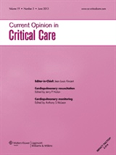
Current Opinion in Critical Care
Advancing knowledge in critical care and intensive medicine.Current Opinion in Critical Care, published by Lippincott Williams & Wilkins, is a leading journal in the field of Critical Care and Intensive Care Medicine. With an ISSN of 1070-5295 and an E-ISSN of 1531-7072, this esteemed journal has been committed to disseminating high-quality and impactful research since its inception in 1996. The journal proudly ranks in the top quartile (Q1) of its category for 2023, affirming its position among the premier publications in critical care, with a Scopus ranking of #25 out of 110, placing it in the 77th percentile. Current Opinion in Critical Care offers essential insights, reviews, and discussions on the latest trends and best practices in the field, catering to the needs of researchers, clinicians, and students alike. Though it does not provide open access options, its contributions are pivotal in shaping patient care approaches and advancing clinical outcomes in critical care settings.
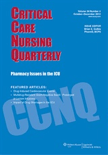
Critical Care Nursing Quarterly
Bridging Research and Practice in Critical CareCritical Care Nursing Quarterly is a distinguished journal published by Lippincott Williams & Wilkins, catering to the vital field of critical care nursing. With an ISSN of 0887-9303 and an E-ISSN of 1550-5111, this journal has been contributing to the advancement of nursing practices since its inception in 1987. Over the years, it has gained recognition, earning a Q3 ranking in Critical Care Nursing for 2023 with a Scopus rank of #9 out of 27, placing it in the 68th percentile of its category. As a non-open access journal, it offers a curated selection of high-quality articles designed to disseminate critical findings, innovative practices, and essential reviews relating to nursing in critical care settings. The journal's ongoing commitment to improving patient care through research and education highlights its pivotal role in shaping the future of critical care nursing. For researchers, professionals, and students alike, Critical Care Nursing Quarterly serves as an indispensable resource in a field that impacts lives daily.
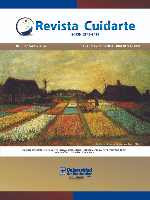
Revista Cuidarte
Empowering Healthcare Innovation and Knowledge SharingRevista Cuidarte is a distinguished Open Access journal published by UNIV SANTANDER in Colombia, aimed at advancing the fields of Community and Home Care, Critical Care and Intensive Care Medicine, Family Practice, and Nursing. Since its inception as an Open Access platform in 2010, this journal has become an essential resource for researchers, healthcare professionals, and students, promoting the dissemination of high-quality, peer-reviewed research. With a scope that encompasses diverse nursing disciplines and healthcare practices, Revista Cuidarte plays a pivotal role in enhancing understanding and innovation in patient care. Despite being categorized in the Q4 quartile for some categories and Q2 for Nurse Assisting in 2023, it actively contributes to the academic discourse through its commitment to accessibility and scholarly rigor, thus serving as a valuable outlet for emerging research ideas and practices. The journal is indexed in Scopus, highlighting its regional and international relevance.

Acute and Critical Care
Exploring breakthroughs in acute medical situations.Acute and Critical Care is a leading open-access journal dedicated to the fields of critical care and intensive care medicine, published by the Korean Society of Critical Care Medicine. Since its inception in 2014, this journal has provided a platform for the dissemination of high-quality research, reviews, and innovative practices aimed at improving patient outcomes in acute medical situations. With an impressive Q2 ranking in both Critical Care and Intensive Care Medicine and in Critical Care Nursing for the year 2023, it is recognized as an influential source of knowledge among professionals in the field. The journal is indexed in Scopus, with notable rankings—7th out of 27 in Critical Care Nursing and 48th out of 110 in Critical Care and Intensive Care Medicine—highlighting its credibility and relevance. Situated in Seoul, South Korea, Acute and Critical Care aims to foster collaboration and engagement within the global community of researchers, presenting cutting-edge clinical applications and advancements in patient care.

CANCER NURSING
Fostering excellence in oncology nursing education and practice.Cancer Nursing, a peer-reviewed journal published by Lippincott Williams & Wilkins, plays a pivotal role in the field of oncology nursing, providing a vital platform for the dissemination of research that enhances patient care and nursing practices related to cancer. With an impressive impact factor and categorized within the Q2 quartile for both oncology and nursing disciplines, this journal ranks among the top resources in its field, sitting at Rank #5 out of 20 in Nursing Oncology. Since its inception in 1978, the journal has continuously evolved to address critical issues in cancer treatment, patient education, and healthcare delivery, making it essential reading for researchers, practitioners, and students alike. Although it does not currently offer open access, the journal's commitment to advancing knowledge in oncology nursing is reflected in its rigorous selection process and the quality of its published research. As we look towards its upcoming issues in 2024, the journal remains a cornerstone for those dedicated to improving cancer care and the overall quality of life for patients and their families.
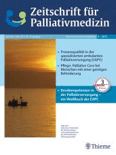
Zeitschrift fur Palliativmedizin
Transforming palliative care with peer-reviewed excellence.Zeitschrift für Palliativmedizin, published by GEORG THIEME VERLAG KG, is a leading journal dedicated to the field of palliative medicine. With its focus on improving the quality of life for patients with severe illnesses, this journal serves as an essential platform for researchers, healthcare professionals, and students interested in the latest developments, practices, and innovations in palliative care. While it does not currently offer open access options, Zeitschrift für Palliativmedizin is committed to disseminating high-quality, peer-reviewed research that advances the understanding and implementation of palliative care strategies. Situated in Stuttgart, Germany, this journal aims to bridge the gap between clinical practice and research, facilitating the exchange of knowledge that enhances patient care and support. As the field continues to grow in importance, this journal stands out as an invaluable resource for those dedicated to improving patient outcomes and advancing the discourse in palliative medicine.
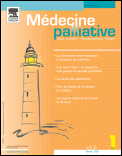
Medecine Palliative
Transforming Pain Management Through Research.Medecine Palliative is a distinguished journal published by Elsevier, dedicated to the vital field of palliative care and pain management. With an ISSN of 1636-6522 and E-ISSN 2213-0098, this international journal has been an essential resource since its inception in 1970, currently covering research from 2004 to 2024. The journal reflects a commitment to enhancing the quality of life for patients facing serious illnesses, addressing critical issues in Anesthesiology and Oncology, while fostering innovative nursing practices in palliative care. While the journal holds a Q3 ranking in Anesthesiology and Pain Medicine and a Q4 in Oncology categories, making it a valuable venue for researchers and practitioners aiming to contribute to the evolving landscape of palliative medicine. Despite its lower rank in some categories, the journal serves as an important platform for insights, clinical findings, and current practices that can significantly impact patient care. Medecine Palliative is accessible to researchers, professionals, and students who are eager to explore the latest advancements and evidence-based approaches in end-of-life care.
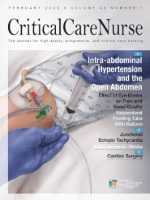
Critical Care Nurse
Enhancing Patient Care with Cutting-Edge Nursing ResearchCritical Care Nurse is a premier journal dedicated to advancing the field of critical care nursing, published by the American Association of Critical Care Nurses. With its consistent ranking in the Q1 category for Critical Care Nursing and impressive Scopus ranking at #8 out of 27, it serves as an essential resource for practitioners and researchers alike. The journal features innovative research, case studies, and reviews aimed at enhancing patient outcomes in critical care settings. As a significant contributor to nursing literature since 1980, Critical Care Nurse provides valuable insights and best practices that bridge the gap between theory and clinical practice, ensuring that professionals stay at the forefront of the ever-evolving healthcare landscape. While it is not an open-access journal, its high impact and relevance make it a critical read for those committed to excellence in critical care.
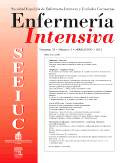
Enfermeria Intensiva
Transforming Intensive Care with Cutting-edge ResearchEnfermeria Intensiva, published by Elsevier Science Inc, is a highly regarded journal in the fields of Advanced and Specialized Nursing as well as Critical Care and Intensive Care Medicine. With an impressive track record spanning from 1994 to 2024, this journal serves as a vital resource for researchers, healthcare professionals, and students dedicated to enhancing the quality of patient care in critical settings. It holds a coveted Q2 ranking in multiple nursing categories as of 2023, reflecting its influence and contribution to the ongoing discourse in nursing practices. Although currently not an open access journal, it continues to provide intricate insights into both fundamental skills and specialized techniques essential in intensive nursing care. By bridging research and practical application, Enfermeria Intensiva plays a pivotal role in advancing knowledge and improving outcomes in critical care environments.
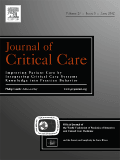
JOURNAL OF CRITICAL CARE
Empowering Healthcare Professionals with Cutting-edge InsightsJOURNAL OF CRITICAL CARE, published by W B SAUNDERS CO-ELSEVIER INC, is a prestigious peer-reviewed journal in the field of critical care and intensive care medicine. With an impressive Q1 classification in 2023, it stands as a leading publication among its peers, ranking #12 out of 110 in the Scopus database, which places it in the 89th percentile of critical care-related journals. Established in 1986 and with a converged timeline extending to 2025, the journal serves as a critical resource for international researchers, healthcare professionals, and students dedicated to advancing practices and understanding within the realm of critical care. Although it does not offer Open Access, the journal provides high-quality, rigorously reviewed articles that address contemporary issues, innovative techniques, and groundbreaking research in critical care medicine. By fostering scholarly dialogue and disseminating new knowledge, the JOURNAL OF CRITICAL CARE is pivotal in shaping the future of intensive patient care and enhancing health outcomes.